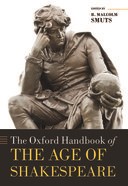 The Oxford Handbook of the Age of Shakespeare
The Oxford Handbook of the Age of Shakespeare
Contents
-
-
-
-
-
-
-
-
-
-
-
England’s Chronicling Tradition England’s Chronicling Tradition
-
Holinshed’s Chronicles: One Chronicle to Rule them All? Holinshed’s Chronicles: One Chronicle to Rule them All?
-
Conclusion Conclusion
-
-
-
-
-
-
-
-
-
-
-
-
-
-
-
-
-
13 English Vernacular Historical Writing and Holinshed’s Chronicles
Get accessDaniel Woolf is Professor of History at Queen’s University in Kingston, Ontario where he is also Principal and Vice-Chancellor. The author of several books and articles on early modern English historical thought and writing, his most recent book is A Global History of History (2011). He also served as General Editor of the five-volume Oxford History of Historical Writing (2011-12).
Jane Wong Yeang Chui is Assistant Professor at Nanyang Technological University (NTU), School of Humanities and Social Sciences. She teaches Renaissance Literature and Modern Asian Literature at NTU. Her research interests include early modern history and literature, particularly in the representations of colonial administration in early modern Ireland, and Asian historical fiction in English. She is also interested in modern drama and has published essays on theatre and drama in Modern Language Review, TDR: The Drama Review; she is also the author of a short monograph on Harold Pinter’s plays entitled Affirming the Absurd in Harold Pinter (Palgrave, 2013).
-
Published:07 July 2016
Cite
Abstract
This chapter examines a key historical text of Shakespeare’s time (and a major source for his history plays), Raphael Holinshed’s ‘Chronicles’, published in two separate and quite distinct editions in 1577 and 1587 respectively. The chapter first situates the Chronicles within the wider context of late medieval and Tudor vernacular historical writing (in particular the chronicling tradition); it then illustrates some of the differences between the two editions with a focus on the contributions of different authors to the composite text, the treatment of Irish history, and a consideration of the issue of government censorship of the two editions. It also briefly reviews changing assessments of Holinshed and the chronicling tradition in modern scholarship.
Sign in
Personal account
- Sign in with email/username & password
- Get email alerts
- Save searches
- Purchase content
- Activate your purchase/trial code
- Add your ORCID iD
Purchase
Our books are available by subscription or purchase to libraries and institutions.
Purchasing information| Month: | Total Views: |
|---|---|
| October 2022 | 6 |
| November 2022 | 4 |
| December 2022 | 5 |
| January 2023 | 2 |
| February 2023 | 4 |
| March 2023 | 6 |
| April 2023 | 8 |
| May 2023 | 4 |
| June 2023 | 2 |
| July 2023 | 6 |
| August 2023 | 5 |
| September 2023 | 2 |
| October 2023 | 6 |
| November 2023 | 7 |
| December 2023 | 2 |
| January 2024 | 3 |
| February 2024 | 3 |
| March 2024 | 5 |
| April 2024 | 1 |
| May 2024 | 3 |
| June 2024 | 7 |
| July 2024 | 2 |
| October 2024 | 2 |
| November 2024 | 7 |
| December 2024 | 7 |
| January 2025 | 6 |
| February 2025 | 2 |
| April 2025 | 1 |

Get help with access
Institutional access
Access to content on Oxford Academic is often provided through institutional subscriptions and purchases. If you are a member of an institution with an active account, you may be able to access content in one of the following ways:
IP based access
Typically, access is provided across an institutional network to a range of IP addresses. This authentication occurs automatically, and it is not possible to sign out of an IP authenticated account.
Sign in through your institution
Choose this option to get remote access when outside your institution. Shibboleth/Open Athens technology is used to provide single sign-on between your institution’s website and Oxford Academic.
If your institution is not listed or you cannot sign in to your institution’s website, please contact your librarian or administrator.
Sign in with a library card
Enter your library card number to sign in. If you cannot sign in, please contact your librarian.
Society Members
Society member access to a journal is achieved in one of the following ways:
Sign in through society site
Many societies offer single sign-on between the society website and Oxford Academic. If you see ‘Sign in through society site’ in the sign in pane within a journal:
If you do not have a society account or have forgotten your username or password, please contact your society.
Sign in using a personal account
Some societies use Oxford Academic personal accounts to provide access to their members. See below.
Personal account
A personal account can be used to get email alerts, save searches, purchase content, and activate subscriptions.
Some societies use Oxford Academic personal accounts to provide access to their members.
Viewing your signed in accounts
Click the account icon in the top right to:
Signed in but can't access content
Oxford Academic is home to a wide variety of products. The institutional subscription may not cover the content that you are trying to access. If you believe you should have access to that content, please contact your librarian.
Institutional account management
For librarians and administrators, your personal account also provides access to institutional account management. Here you will find options to view and activate subscriptions, manage institutional settings and access options, access usage statistics, and more.